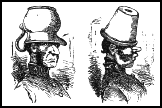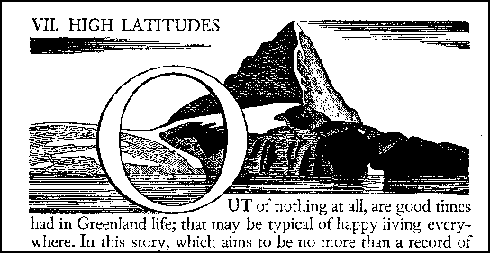Great Books of
2004
From Vittula
Mikael Niemi
Laurie Thompson
Translator
(Seven Stories Press)
review
The Past and Future of
Body Technology
Edward Tenner
(Knopf)

The pince-nez, kept in place by spring pressure alone, was the first eye wear to become a fad among both men and women. Many ophthalmologists and opticians considered it difficult to fit, and the glasses fell off repeatedly. Yet ... contemporaries thought the design avoided the "elderly appearance" of spectacles with temples.Tenner is genius, pure and simple, his writing is a pleasure, and Our Own Devices is the fascinating world around you brought to life in a thousand thousand details. Get it. Got it? Good.
review
José Saramago
(Harcourt)
review
Rockwell Kent
(Wesleyan University Press)

One of my definitions of a good travel writer is that he has to take the most simple day-to-day activity and make you want to be there.The second is that he must either make himself interesting or funny or so strange that we want to be there with him or her --- in the midst of it all, enjoying the hell out of it, the good and the bad of it, not wanting it to end.
In this way, Kent is a star in the diadem of travel-writing: on the same level as Helena Petrovna Blavatsky on India, or Hugo Williams on the Far East, or Blaise Cendrars on South America, or S. J. Perelman or Captain Joshua Slocum on sailing around the world, or Carlos Amantea or the virtually unknown but down-home charming Everett Gee Jackson on Mexico.
Go to the original
review
The Best of
Ed Zern
Ed Zern
The Lyons Press

For some of us he is a lifetime addiction. It might have to do with the names. Zern seems to know everyone and anyone in this country who spends any time at all hunting and fishing: He's constantly dropping names of people we've never heard of. Hell, I don't know --- maybe he makes them all up.He also seems conversant with every place in America and the rest of the Western world where one can drop dry flies in a cold river, or fish from a boat, or take a shotgun to zebras, deer, woodcocks, or spend mornings shivering in a blind waiting for ducks or turkeys to happen by.
Some of his charm is his well-disguised intellectualism. In one of his pieces for Field & Stream --- Field & Stream, mind you --- he slips in references to Wagner (comparing his operas to big game hunting), Bach Sonatas (trout fishing with a dry fly). Proust and Joyce turn up here or there, as does D. H. Lawrence.
Go to the original
reviewArrogance
Joanna Scott
(Picador)Is this the real Egon Schiele? Maybe. Maybe it makes no difference, for Ms. Scott has created an awesome artist, a demented artist --- brought him to life for us. She may be wrong: he might have been, in reality (whatever that may be) a sweetheart, a shy wall-flower, a churchgoer. But she has captured a wild and awful and brilliant man, in a brilliant way, and we don't want to disbelieve her, or even care, for we would be losing too much.There have been gripping books about artists before. We think of Bertram Wolfe's The Fabulous Life of Diego Rivera, Jean Renoir's Renoir, My Father, and Rembrandt by Gladys Schmitt. But there has been only one to match Arrogance, for getting us enmeshed in the soul of the artist --- the tricky, devilish, pure, dark soul of the artist: Joyce Cary's The Horse's Mouth.
Go to the original
reviewFrontiers of Heaven:
A Journey to
The End of China
Stanley Stewart
Lyons PressThis reviewer fell in love with Stewart early on, at the same moment he fell in love with Fu Wen in Xi'an. He begs her: "Come with me ... Come to Tulufan. Come to Wulumuchi. Come to Kashi. I will meet you there. When can you come?""It is not possible," she said.
I put my lips to the little spoon of skin, the soft pulse. She tilted her head back against a pillar, an equine arching. Her skin was buttery and smelt of almonds.
And then? A pause. And then? Listen:
In the twilight the old men's pet crickets were singing their hearts out. They sang of love, the males and females serenading one another across the darkening gardens from their little wicker cages. Their duets could last for hours. In protracted litanies of offerings and response, they were trying to identify and assess one another. If one of them departed from the melody by as little as a fourth of a tone, the exchange was abandoned, to be taken up later with another. It was a quest for compatibility, the wisdom of crickets.
This is, I put it to you, gentle, artful ... and not a little tragic.
Go to the original
review
Buddha Da
Anne Donovan
(Carroll & Graf)By page twenty-five I was saying to hell with the dialect, this lady can write. By page fifty you'd have to use a jackhammer to get Buddha Da out of my hands.This strange lovely language adds another level to what is already an interesting piece of writing. All this stuff is going on: Jimmy getting enmeshed in Buddhism, driving everyone mad; Anne Marie filling her days as kids will with school and music and a tape competition for the BBC; Mum taking this Buddha stuff for as long as she can, then going out to glom onto young David who brings her body, hungry from too many months of enforced celibacy, back to life:
All the time we were daein it ah felt as if as was split in two, as if part of me was inside ma body, feelin, and another part of me was somewhere up on the ceilin, watchin ... And it was like ridin; the rhythm was perfect, like these guys that ride waves on surfboards, hittin just the right spot.
Those speaking the language are the main characters in the Buddha Da. Others --- teachers, doctors, lawyers --- communicate with King's English, and soon, for the reader, the King's English is not enough. Anne Donovan is probably a poet pretending to be a novelist. Leastwise, she got me caught in her poetry, so that when those teachers and doctors and lawyers start in talking English, I worry that they don't have the poetry. You try writing a story about a mother and her daughter buying blouses at the Gap and make it sound like pure verse out of Bobby Burns:
Ah pulled the blue wan over ma heid and the two ae us are stood there and she was nearly as tall as me. She's that like Jimmy wi her fair hair and her eyes are exactly like his. And ah don't know if it was seein her all grown up like that of if it was no bein able tae see anythin of masel in her, but all of a sudden ah felt as if ah was gonnae greet. Ah turnt ma heid away and started tae pull aff the top, tryin tae hide ma tears but Annne Marie seen them.
"Mammy, are you OK?"
"Ah'm fine, hen."
Go to the original
review
Michelangelo and
The Pope's Ceiling
Ross King
John Lee, Reader
(Books on Tape)Ross King not only writes knowingly about the painting of the Sistine Chapel and about classical and contemporary (14th - 16th century) art and artists --- he offers exquisite details on the art of frescoing, information on how to cast bronze statues, and insights into the continual and often alarming (to Michelangelo) bickering between popes, papal states, independent Italian republics, French armies, Spanish soldiers-of-fortune, and Swiss freebooters. King is no sourpuss, and the story is often quite merry. He lets us in on the rich eccentricities of the characters of the times --- not only Michelangelo Buonarroti, but Raphael Sanzio, Leonardo da Vinci, and most fun of all, Pope Julius, "Il Terrible." Indeed, Julius II reminds us of a lusty character out of Rabelais --- a fearsome hunter, a noisy warrior, an intemperate fighter, an opinionated crackpot. He was forever hitting on people when he was angry (or ecstatically happy).
How strange it is in retrospect that this noisy, syphilitic-ridden rowdy selected the young and inexperienced Michelangelo from all other possible artists to paint the fresco in the Sistine Chapel --- that holy of holies --- and continued to support him even when Michelangelo was being his most obstreperous.
Go to the original
review
Housekeeping
Marilynne Robinson
(Picador)The real business of Housekeeping evokes the eccentric world of those who live around us but never see us, as we never see them. Sylvie has trouble with words and consecutive thoughts, not unlike a worshipper of religions from the East. She has "no awareness of time."
For her, hours and minutes were the names of trains --- we were waiting for the 9:52. Sylvie seemed neither patient nor impatient, neither comfortable nor uncomfortable.
She collects bales of newspapers and mountains of tin-cans in the house. Her stories are disjointed, about people she may or may not have known. Always around her are the ghosts of children playing and laughing, and she seems unaware of the difference between ghosts and the real.
The reader gets to be fond of her distracted way, and when, finally, the sheriff of Fingerbone points to her, tries to take Ruth away, we find ourselves rooting for this half-mad, not unsaintly woman, who teaches Ruth, like her, in the lingo of the time, "to drift."
Go to the original
review
